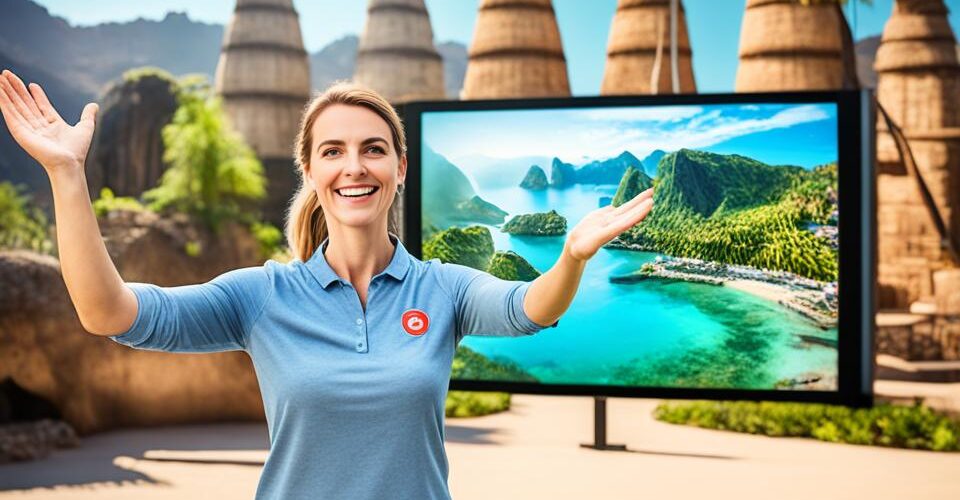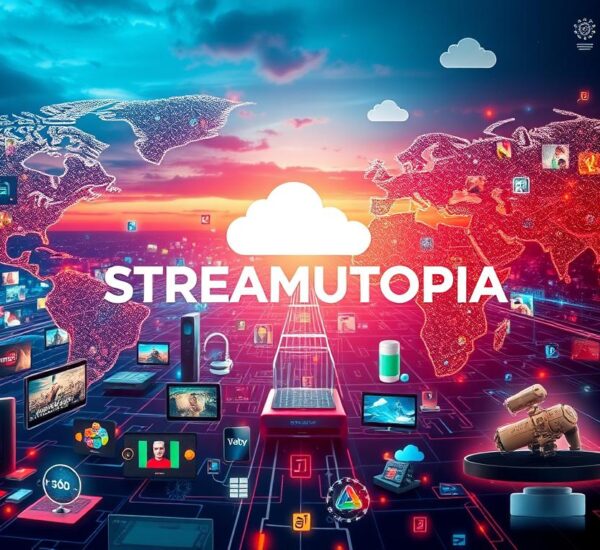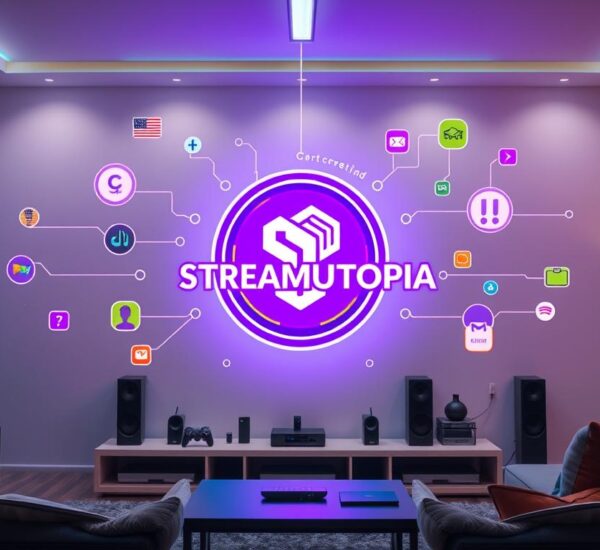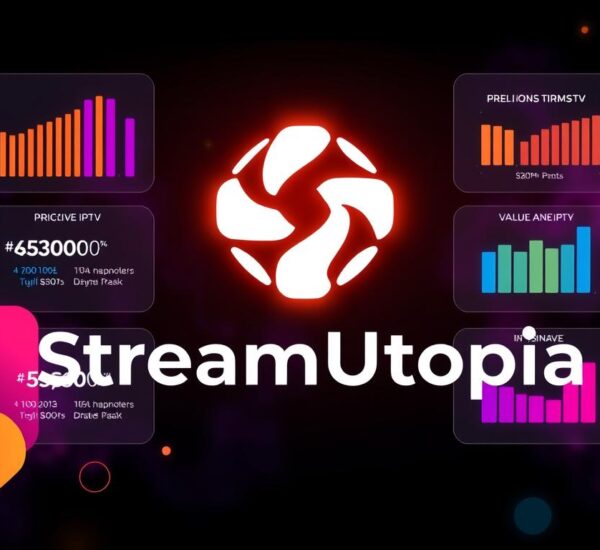Did you know that virtual tours and destination exploration from home have become a booming trend in the travel industry? With the advancement of IPTV (Internet Protocol Television) technology, people can now embark on immersive travel experiences without leaving their homes.
Key Takeaways:
- IPTV technology is revolutionizing the way we explore destinations and take virtual tours.
- Virtual tours from home offer an interactive and immersive experience using augmented reality (AR) and virtual reality (VR).
- Travel enthusiasts can explore famous landmarks and destinations remotely, enhancing home entertainment possibilities.
- Online experiences provided through IPTV allow for interactive streaming and interactive travel experiences.
- Digital tourism through IPTV opens up new opportunities for remote travel and destination exploration.
Enhancing the Viewing Experience
Augmented Reality (AR) and Virtual Reality (VR) technologies offer viewers a truly immersive experience. VR, in particular, can transport you to entirely new environments, from the comfort of your own home. With AR and VR, content providers can create highly personalized experiences. VR headsets allow you to interact with the content, turning passive watching into an engaging adventure.
Immersive Content:
AR and VR technologies enable the creation of immersive content, providing viewers with a heightened sense of realism and involvement. Whether it’s exploring ancient civilizations or witnessing fictional universes come to life, immersive content brings entertainment to a whole new level.
Personalized Content:
AR and VR empower content providers to deliver personalized experiences tailored to individual preferences. By analyzing user data and behavior, IPTV platforms can curate content recommendations that cater to each viewer’s unique interests and enhance their overall viewing experience.
Interactive Viewing:
AR and VR transform passive viewing into interactive experiences. These technologies allow users to interact with the content, providing a deeper level of engagement and interaction. From controlling the storyline to participating in virtual simulations, interactive viewing offers a sense of agency and involvement.
| Benefits of AR and VR in Enhancing the Viewing Experience | Example |
|---|---|
| Immersive content that transports viewers to new environments | |
| Personalized experiences tailored to individual preferences | |
| Interactive viewing that allows users to actively engage with the content |
The Impact on Gaming
The gaming industry stands on the precipice of a groundbreaking transformation, courtesy of the convergence of IPTV with Augmented Reality (AR) and Virtual Reality (VR). This revolutionary combination is set to revolutionize gaming and open up new frontiers of immersive experiences.
Virtual Reality offers gamers an unparalleled level of immersion, enabling them to physically engage and move within the game’s virtual world. With VR headsets and controllers, players can actively participate in the digital realm, turning passive gaming into an interactive adventure.
But the impact of IPTV, AR, and VR on gaming extends beyond individual engagement. These technologies also have the potential to connect gamers across platforms, fostering a truly cross-platform gaming ecosystem. Gone are the days of fragmented gaming experiences; now, gamers can compete and collaborate seamlessly, irrespective of their chosen gaming device or platform. This cross-platform gaming revolution transcends traditional boundaries and creates a sense of unity in the gaming community.
Mixed Reality Games
An exciting development in gaming is the emergence of Mixed Reality (MR) games, which fuse physical and digital elements into a cohesive and interactive experience. In MR games, players can incorporate their real-world surroundings into the gameplay and interact with virtual objects in a truly immersive way. This blending of physical and digital realms ushers in a new era of gaming, where reality and fantasy seamlessly coexist.
Whether it’s exploring ancient ruins in your living room or battling virtual enemies in your backyard, MR games transport players into a realm where the boundaries between real and virtual blur.
| Revolutionizing Gaming with IPTV, AR, and VR: | Benefits: |
|---|---|
| 1. Enhanced Immersion: | Immerse yourself in virtual worlds like never before and physically interact with the game environment. |
| 2. Cross-Platform Connectivity: | Connect and play with gamers across different devices and platforms, breaking down barriers. |
| 3. Mixed Reality Experiences: | Explore captivating gameplay that merges physical and digital elements, blurring the line between reality and virtuality. |
Educational Opportunities
AR and VR offer incredible opportunities for interactive learning. Through the integration of IPTV with Augmented Reality and Virtual Reality technologies, students can engage in immersive educational experiences that transcend the traditional classroom setting. These technologies revolutionize the way knowledge is acquired and applied, fostering a dynamic and engaging approach to learning.
Interactive Learning
With IPTV and AR, students can actively participate in the learning process through interactive simulations and real-world applications. Whether it’s exploring historical landmarks, dissecting virtual organisms, or practicing complex scientific experiments, interactive learning experiences enable students to grasp complex concepts in a tangible and experiential manner. By actively engaging with the content, students develop a deeper understanding and retain knowledge more effectively.
Real-World Simulations
AR and VR technologies provide students with the opportunity to engage in real-world simulations, enabling them to safely explore and experiment in various fields. For example, medical students can practice surgeries in a risk-free virtual environment, allowing them to gain valuable hands-on experience before working with real patients. These simulations enhance learning outcomes by providing a safe space for experimentation, fostering critical thinking and problem-solving skills.
Global Classrooms
IPTV with AR and VR has the potential to connect teachers and learners globally, transcending geographical boundaries. Through virtual classrooms, students can collaborate with peers from different parts of the world, exchanging ideas and perspectives, and fostering cultural understanding. This global connectivity enriches the learning experience by exposing students to diverse perspectives, promoting empathy, and preparing them for the interconnected world they will navigate.
Overall, the integration of IPTV with Augmented Reality and Virtual Reality technologies opens up new educational possibilities and expands the horizons of learning. These technologies empower students to actively engage in their education, learn through realistic simulations, and connect with a global community of learners. As the educational landscape continues to evolve, IPTV, AR, and VR will play a pivotal role in shaping the future of interactive and immersive learning.

The Future of Shopping
AR and VR are revolutionizing the way we shop, opening up a world of possibilities for consumers. Virtual shopping, powered by IPTV, allows you to try on clothes virtually and visualize furniture in your home before making a purchase. This enhanced retail experience brings convenience and excitement to the shopping process.
In physical stores, AR technology offers additional information about products and allows for virtual testing. Imagine walking into a clothing store and using your smartphone to see how different outfits would look on you or exploring a virtual showroom to experience the full potential of a product. Augmented reality enhances the shopping experience by adding a layer of interactivity and personalization, enabling shoppers to make more informed decisions.
Furthermore, the concept of the metaverse is rapidly evolving. The metaverse is a collective virtual shared space where people can socialize, work, and play. It’s a digital realm that transcends traditional boundaries, offering endless opportunities for immersive experiences.
Comparison of Virtual Shopping Platforms
| Platform | Features | Benefits |
|---|---|---|
| Platform A | Virtual dressing rooms, realistic product visualization | Convenient, saves time, reduces returns |
| Platform B | Virtual home furnishing, room customization | Provides design inspiration, helps visualize products in home setting |
| Platform C | Interactive product information, augmented reality browsing | Enhances shopping experience, encourages exploration |
Virtual shopping powered by augmented reality and IPTV is changing the way we engage with retail. With the advancement of technology, the future of shopping holds even greater potential for immersive experiences and seamless integration between the physical and virtual worlds.
AR and VR Challenges and Concerns
As the popularity of Augmented Reality (AR) and Virtual Reality (VR) continues to grow in the field of Internet Protocol Television (IPTV), concerns about data privacy and security have emerged. With the immersive experiences offered by AR and VR, safeguarding user information becomes crucial to ensure trust and confidence in these technologies.
Technological barriers also pose challenges to the widespread adoption of AR and VR in the IPTV landscape. Access to advanced hardware capable of delivering high-quality AR and VR experiences can be costly, limiting the accessibility of these technologies to a broader audience.
Furthermore, the availability of compelling content plays a critical role in the success of AR and VR in IPTV. The variety and quality of content will determine the level of engagement and satisfaction users experience. It is essential for content creators to consistently deliver captivating and immersive experiences that captivate audiences and keep them coming back for more.
To summarize, the key challenges and concerns regarding AR and VR in the context of IPTV are:
- Data privacy and security
- Technological barriers
- Content quality and variety
The Road Ahead
As Augmented Reality (AR) and Virtual Reality (VR) become more affordable and user-friendly, their adoption in the IPTV space is expected to increase exponentially. These cutting-edge technologies are set to revolutionize the way we experience entertainment and open up new career paths in the industry.
Increasing Adoption: The Future of IPTV
With the decreasing cost of AR and VR devices, more consumers are embracing these immersive technologies. As a result, IPTV is evolving into a hub for gaming, movies, and traditional television, offering seamless and unique experiences like never before.
New Career Paths: Content Creation, Development, and Design
The growing demand for AR and VR content will create exciting job opportunities in content creation, development, and design. As the IPTV landscape expands, talented individuals will be needed to craft immersive experiences and innovative storytelling.
Entertainment Evolution: Gaming, Movies, and Traditional Television
AR and VR are set to revolutionize the entertainment industry by enhancing gaming experiences, creating immersive movie experiences, and transforming the way we view traditional television. Viewers will be transported into exciting digital worlds and have the ability to interact with their favorite characters and storylines.
Telehealth Advances: Revolutionizing Healthcare
The healthcare sector is embracing AR and VR technologies for telehealth services, advancing doctor visits and remote consultations. Patients can receive medical care and therapy from the comfort of their own homes, reducing the need for physical travel and increasing accessibility to healthcare services.
| New Career Paths | Entertainment Evolution | Telehealth Advances |
|---|---|---|
|
|
|
Travel and Exploration
With the advent of Augmented Reality (AR) and Virtual Reality (VR), travel and exploration have taken on a whole new dimension. These immersive technologies offered by IPTV allow you to embark on virtual tours and visit far-off destinations without leaving the comfort of your living room.
Virtual tours have revolutionized the way we experience travel, making it accessible to everyone. Whether you dream of exploring ancient ruins, iconic landmarks, or natural wonders, AR and VR can transport you there with stunning realism. You can walk through the ancient pyramids of Egypt, marvel at the beauty of the Grand Canyon, or stroll through the bustling streets of Paris, all from the convenience of your own home.

But the exploration doesn’t stop there. AR enhances the onsite experience by providing real-time information and acting as a personal tour guide. Want to know the history behind a particular monument? Simply point your smartphone or tablet at it, and AR will overlay fascinating facts and information, enriching your experience and deepening your understanding of the world around you.
The Benefits of Virtual Tours and AR in Travel:
- Accessible exploration for all, including those with physical limitations
- Cost-effective alternative to physical travel
- No language barriers, as information can be translated instantly
- Provides unique perspectives and angles not possible in real life
- Interactive and engaging educational experiences
- Reduces the environmental impact of travel
Whether you’re a travel enthusiast, an armchair explorer, or simply looking for a new way to broaden your horizons, IPTV powered by AR and VR technologies offers endless possibilities for travel and exploration.
Sustainability Benefits
AR and VR technologies offer significant sustainability benefits by reducing the need for physical travel and the construction of new infrastructure. By embracing these immersive technologies, we can minimize our carbon footprint and reduce the environmental impact associated with traditional forms of travel.
Reduced Physical Travel
One of the key sustainability advantages of AR and VR in the context of IPTV is the ability to explore destinations virtually, eliminating the need for physical travel. Through interactive streaming and remote experiences, users can embark on virtual tours, visit landmarks, and immerse themselves in different cultures, all from the comfort of their own homes. This reduces the demand for air and road travel, resulting in fewer greenhouse gas emissions and less energy consumption.
| Benefits of Reduced Physical Travel | |
|---|---|
| 1. Environmental Conservation | By minimizing travel, we can protect delicate ecosystems, wildlife habitats, and natural resources. This helps in preserving biodiversity and promoting environmental sustainability. |
| 2. Lower Carbon Footprint | Virtual exploration significantly reduces carbon emissions from transportation, helping to mitigate climate change and air pollution. |
| 3. Resource Conservation | Less physical travel means decreased consumption of fuel, water, and other finite resources, contributing to sustainable resource management. |
Infrastructure Savings
AR and VR technologies also offer substantial infrastructure savings. Traditional travel often requires the construction of hotels, resorts, transportation networks, and supporting facilities. With virtual exploration, these infrastructure requirements are minimized, leading to reduced construction and maintenance costs.
In addition, virtual experiences can be scaled and accessed by a large number of users simultaneously, eliminating the need for extensive physical infrastructure to accommodate crowds. This reduces the environmental impact of urban development and land usage, allowing natural areas to be preserved.
Environmental Education and Awareness
AR and VR in IPTV provide an excellent platform for environmental education and awareness. Through immersive experiences, users can learn about the importance of conservation, sustainable practices, and the impact of human activities on the planet. These technologies have the potential to foster a greater understanding of environmental issues and encourage positive behavioral changes.
Overall, by harnessing the power of AR and VR in IPTV, we can contribute to sustainability efforts, mitigate the environmental impact of travel, and promote a more eco-friendly approach to exploring the world.
Introduction
The COVID-19 pandemic has brought unprecedented challenges to the tourism industry, causing a significant decline in travel and exploration. However, this setback has also accelerated the adoption of online digital technologies to reimagine and transform the tourism sector. Among these technologies, IPTV, Augmented Reality (AR), and Virtual Reality (VR) have emerged as powerful tools in facilitating digital transformation and offering immersive experiences for travelers from the comfort of their homes.
By integrating IPTV with AR and VR, tourists can embark on virtual tours, experience destination exploration, and enjoy interactive streaming, bringing the wonders of the world right to their screens. These innovative technologies open up a world of possibilities for digital travelers, revolutionizing the way we engage with tourism and shaping the future of travel and entertainment.
In this section, we will explore how the convergence of IPTV, AR, and VR is reshaping the tourism industry, enabling virtual experiences, and driving digital transformation. We will also discuss the impact of these technologies on travel preferences and the potential they hold for creating a new era of tourism.
Perceived Quality and Expectation Confirmation
Perceived quality plays a critical role in the success of online digital technologies such as IPTV, Augmented Reality (AR), and Virtual Reality (VR). When it comes to enhancing user satisfaction, content quality, system quality, and service quality are of utmost importance. The seamless integration of these factors ensures a remarkable experience for users engaging with online digital platforms.
The quality of content is a key determinant of perceived quality. Users expect high-definition visuals, realistic simulations, and engaging narratives. Whether it’s an online digital art exhibition or an on-site visitation, the content must meet or exceed user expectations to create a lasting impression.
Content Quality
Content quality encompasses various aspects, including:
- Visual appeal and fidelity.
- Immersive storytelling.
- Interactivity and engagement.
- Accurate and up-to-date information.
- Optimized performance for different devices and screen sizes.
By consistently delivering high-quality content, IPTV, AR, and VR platforms can exceed user expectations, resulting in heightened satisfaction and increased usage.
System Quality
System quality refers to the technical performance and reliability of the digital platform. Users expect seamless functionality, minimal latency, and smooth navigation. A robust infrastructure, efficient data processing, and reliable connectivity contribute to delivering high system quality.
For example, in IPTV services, buffering issues, pixelation, or inconsistent streaming can greatly impact users’ perception of the platform’s quality. To address these concerns, providers need to invest in robust infrastructure, optimized servers, and efficient content delivery networks.
Service Quality
Service quality focuses on the level of customer support, responsiveness, and overall user experience. Prompt and effective customer service, user-friendly interfaces, and personalized recommendations contribute to enhancing service quality.
Providers must strive to offer timely assistance, address user queries promptly, and provide seamless user interfaces that enhance ease of use and navigation. By consistently delivering outstanding service, providers can exceed user expectations, leading to increased satisfaction and loyalty.
The following table summarizes the key factors influencing perceived quality in online digital technologies:
Conclusion
The future of IPTV with Augmented Reality (AR) and Virtual Reality (VR) is poised to revolutionize the way we consume content, transforming our understanding of entertainment, education, and daily life. The potential for AR and VR technologies in the IPTV landscape is vast, offering endless possibilities and new opportunities.
However, as we move towards this transformation, there are challenges that need to be addressed. Data privacy concerns and technological barriers must be carefully navigated to ensure a safe and secure user experience. Content creators and providers must strive to deliver high-quality and diverse content to meet the evolving expectations of viewers.
Despite these challenges, the fusion of AR and VR technologies holds immense promise. It has the power to create immersive, interactive, and unforgettable experiences, taking the IPTV journey to new heights. The future of IPTV with AR and VR beckons us to embrace the unknown, embrace the transformative potential, and unlock a world of possibilities.
FAQ
How can Augmented Reality (AR) and Virtual Reality (VR) enhance the IPTV viewing experience?
How are AR and VR revolutionizing the gaming industry through IPTV?
What educational opportunities do AR and VR offer through IPTV?
How do AR and VR technologies impact shopping through IPTV?
What challenges and concerns come with the adoption of AR and VR in the IPTV landscape?
What can we expect in the future of IPTV with AR and VR?
How do AR and VR technologies contribute to travel and exploration through IPTV?
What sustainability benefits do AR and VR technologies bring to the IPTV landscape?
How have AR and VR technologies transformed the tourism industry through IPTV?
What role does perceived quality play in the success of online digital technologies in IPTV?
What is the future of IPTV with AR and VR?





